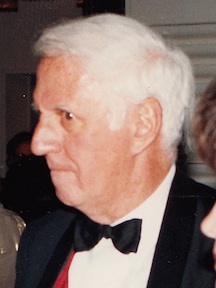Austin P. Harrison
Sam Summerlin, one of America’s most influential voices in the reporting world, passed away on February 27. He was 89 years old. His work and the life he led are nothing short of astounding. Born January 1, 1928, Summerlin is a native of Chapel Hill, North Carolina. He attended school in his hometown and graduated Phi Beta Kappa from the University of North Carolina at Chapel Hill in 1948. Summerlin wasted no time putting his journalism degree to work and secured a job with the world-renowned Associated Press in the same year.
Two years after graduation, Summerlin was spending most of his time reporting mundane local events. When the Korean War erupted, he was sent to the other side of the globe, eager to cover the clash. After three years of conflict, the Korean and Chinese governments agreed upon an armistice, and Summerlin was the first reporter to relay the message back to The Associated Press: “Flash: The Korean War is Over.” The scoop was one of the defining moments of his career.
After his time in Asia, The Associated Press appointed Summerlin Chief Correspondent for the Caribbean and Central America. In 1954, Summerlin touched down in Cuba and began his work in the region. Ernest Hemmingway, the famed American writer with a notorious disdain for reporters, happened to be one of the first people Summerlin befriended. Hemmingway respected Summerlin’s professionalism when he first contacted him, and before long the two developed an affable relationship. In fact, when Hemmingway won the Nobel Prize for Literature in 1954, he called Summerlin to allow him to be the first to interview him on his achievement.
In addition to spending time with literary superstars, Summerlin covered much of the socio-political turmoil experienced in Central and Latin America during the 1950s and 60s. This includes the Argentinian, Guatemalan, and Cuban revolutions. Summerlin met with Che Guevara as his revolution raged, as well as Juan Peron as the power of his regime slipped through his fingers. When Nazi fugitive Adolf Eichmann was apprehended in Argentina in 1960, Summerlin was again at the forefront in bringing this story to the public. In 1975, Summerlin received the Maria Moors Cabot Gold Medal for helping expand The Associated Press in Latin America through his commitment to reporting diverse and dynamic stories over the years.
As he aged, his work grew increasingly diverse. In 1963, Summerlin became the chief of The Associated Press – New Orleans Bureau. During the Civil Rights Movement, American was charged with racial tensions, especially in areas of the Deep South. Summerlin’s new position brought him face to face with the violence that anti-segregationist protesters too often had to endure.
By the end of his career, Summerlin had worked for The New York Times, become an accomplished TV documentary producer, and authored several books, including The China Cloud (1968) and Latin America: Land of Revolution (1972). But The Associated Press maintained a special place in his heart. In a 2004 interview for The Associated Press’ archives, Summerlin said “[I] treasured [my] days as an AP foreign correspondent the most.”
In 1987, Summerlin was inducted into the University of North Carolina’s Journalism Hall of Fame. Sam Summerlin lived a full and adventurous life, the kind that most journalists only dream about. He was the man who experienced first-hand some of the most important events of the 20th century, and he lived long enough to tell us those stories.
Austin P. Harrison is a junior at George Mason University majoring in environmental science with a concentration in conservation. George Mason is home to the Omicron of Virginia Chapter of Phi Beta Kappa.




